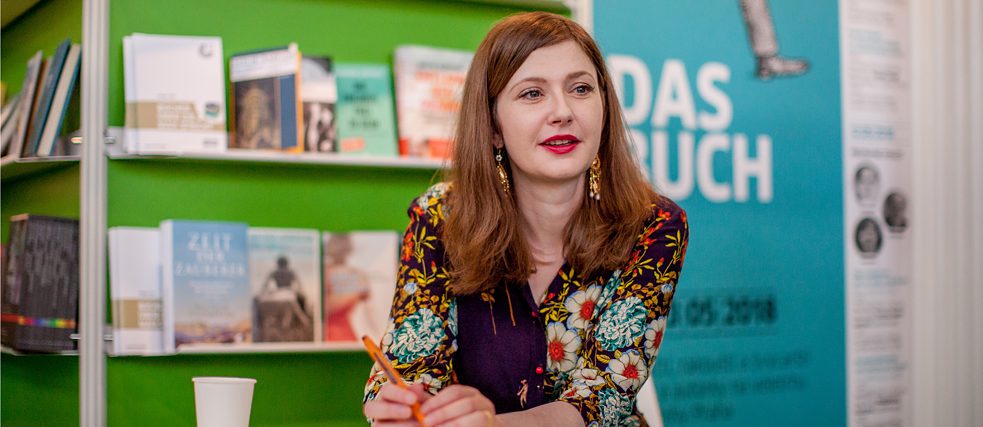Olga Grjasnowa
Unbiased Diagnosis of our Times

Olga Grjasnowa at Prague Book Fair
|
© Björn Steinz/Goethe-Institut
Olga Grjasnowa weaves complex political issues into her remarkable plots. Her analytical eye and refreshingly distinctive style enthuse readers and critics alike.
AT A GLANCE
Olga Grjasnowa was born in 1984 to a Russian Jewish family in Baku, Azerbaijan. In 1996 her family emigrated and settled in Hesse as “quota refugees”, where she learned German at the age of 11. In 2010 she graduated with a BA in Creative Writing from the Deutsches Literaturinstitut Leipzig. After studying abroad in Poland, Russia (at the Maxim Gorky Literature Institute), and Israel, Grjasnowa took up dance studies at the Freie Universität Berlin. Grjasnowa is married to Ayham Majid Agha, a Syrian-born actor, with whom she has a daughter.Her critically acclaimed debut novel Der Russe ist einer, der Birken liebt (All Russians Love Birch Trees) won the Klaus-Michael Kühne Prize and the Anna Seghers Prize in 2012. Her next novel, Die juristische Unschärfe einer Ehe (The Legal Haziness of a Marriage) written on a grant from the Berlin Senate, came out in 2014 and won the Chamisso Prize. Her first two books have both been adapted for the stage. Her latest, Gott ist nicht schüchtern (City of Jasemine) came out in 2017.
Headstrong bicultural protagonists
Grjasnowa is acclaimed for her sharp, analytical eye and refreshingly idiosyncratic style. In 2012 she won the Anna Seghers Prize and was nominated for the German Book Prize. In her first novel, All Russians Love Birch Trees, Olga Grjasnowa portrays an autonomous, determined, even driven young woman. Her second novel, The Legal Haziness of a Marriage, features similarly headstrong characters who are continually reinventing themselves. What they have in common is their relative indifference to such constraining categories of identity as native country, culture and religion. This independent streak also means a readiness to strike camp and move on whenever things are liable to get too intense, too serious, too confrontational.The settings for All Russians Love Birch Trees – whose protagonist is born in Baku and grows up in Hesse as a Jewish "quota refugee" – partly overlap with the author’s itinerary, and yet the story is by no means autobiographical. A conscientious observer, Olga Grjasnowa wants to get to know precisely what she is writing about. Consequently, what most excited her during her studies at the Deutsche Literaturinstitut in Leipzig, which she completed in 2010, were mainly the research workshops. The theory that Olga Grjasnowa was missing in Leipzig she acquired during study terms at the Maxim Gorki Literary Institute in Moscow and from a “Scenic Writing” course at the Universität der Künste in Berlin. For the novel’s flashbacks to the war between Armenia and Azerbaijan over the disputed region of Nagorno-Karabakh in the Caucasus, she researched extensively on location and interviewed locals. Her object, says Grjasnowa, is to enable us to comprehend "how ethnically motivated violence works, how pogroms can be set in motion within a matter of weeks – and not only there."
Road movie in the Caucasus
Grjasnowa worked her Caucasus research into the next novel as well: The Legal Haziness of a Marriage, for which she won the 2015 Adalbert von Chamisso Prize. Her aim, she explains, is to draw a "stark contrast between present-day post-Soviet life in Azerbaijan, Georgia, Armenia and Russia, where homophobic violence is public policy, and Berlin’s oblivious party scene". The main characters, a ballerina (Leyla) and a psychiatrist (Altay), contract a so-called “lavender marriage” to conceal their homosexuality and live untroubled in Moscow. But a close bond of tenderness that requires no further definition develops between them. The story follows them to Berlin and – a few crises, entanglements and one love triangle later – on to Baku, culminating in a sharply observed, succinctly and straightforwardly recounted road movie across the Caucasus. Freedom and a mentality of entitlement repeatedly clash, and just when it looks as though their private lives could work out fine, a friendly but brutal pressure to conform to social norms and submit to pre-existing power relations returns with a vengeance.UNBIASED DIAGNOSES OF OUR TIMES
Grjasnowa’s latest novel, published in 2017, is entitled City of Jasemine. It tells the moving story of Amal and Hammoudi, two good-looking, privileged young Syrians who believe in the revolution in their country. When we first meet Amal, she has just enjoyed the taste of her first success as an actress and is dreaming of future fame. Two years later, we find her adrift in the sea, after the sinking of a cargo ship that was to smuggle her into Europe, and saving the life of an infant that she will subsequently make her own. Meanwhile, Hammoudi has just completed his medical studies and landed a job at a hospital in Paris. So he travels to Damascus to take care of the paperwork. But then we find him sitting with a hundred strangers on a small rubber dinghy, hoping against hope to make it as far at Lesbos alive. When they finally meet again in Berlin, Amal and Hammoudi have lost everything and have to start all over again.ABUNDANT NEW MATERIAL FOR WRITING
"When I'm upset about something, I write," says Olga Grjasnowa. That being the case, she has ample reasons to write: mental lethargy, dissociation mania and everyday racism are just a few of the engrained mindsets that she seizes on and dissects – though casually, in passing – in unembellished and slightly ironic diagnoses that run parallel to the plot, as if on a split screen. This goes for her contributions to the freestyle literary blog of the German weekly newspaper Die Zeit and to the Conflict Food project at the Gorki Theatre in Berlin, in which her actor husband Ayham Majid Agha and a chef of French, Indian or Persian cuisine cook together with the audience, while dissecting gender stereotypes and cultural and political attributions.Olga Grjasnowa reads from City of Jasmine